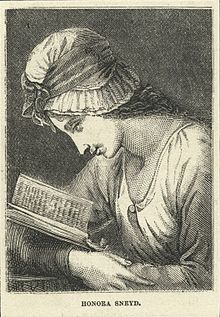Honora Sneyd
| Honora Sneyd | |
|---|---|

"Serena Reading", after George Romney
|
|
| Born | 1751 Bath, Somerset |
| Died |
(aged 28) Weston-under-Lizard, Staffordshire |
| Resting place | Weston-under-Lizard, Staffordshire |
| Nationality | British |
| Occupation | Writer, educator |
| Spouse(s) | Richard Lovell Edgeworth (1744–1817) |
| Children |
|
| Parent(s) |
|
| Relatives |
|
Honora Sneyd (Honora Edgeworth, née Sneyd ) (1751 – 1 May 1780) was an eighteenth-century English writer, mainly known for her associations with literary figures of the day particularly Anna Seward and the Lunar Society, and for her work on children's education.
Honora Sneyd was born in Bath in 1751, and following the death of her mother in 1756 was raised by Canon Thomas Seward and his wife Elizabeth in Lichfield, Staffordshire until she returned to her father's house in 1771. There, she formed a close friendship with their daughter, Anna Seward. Having had a romantic engagement to John André and having declined the hand of Thomas Day, she married Richard Edgeworth as his second wife in 1773, living on the family estate in Ireland till 1776. There she helped raise his children from his first marriage, including Maria Edgeworth, and two children of her own. Returning to England she fell ill with tuberculosis, which was incurable, dying at Weston in Staffordshire in 1780. She is the subject of a number of Anna Seward's poems, and with her husband developed concepts of childhood education, resulting in a series of books, such as Practical Education, based on her observations of the Edgeworth children. She is known for her stand on women's rights through her vigorous rejection of the proposal by Day, in which she outlined her views on equality in marriage.
Honora Sneyd was born the third daughter to Edward Sneyd, of Bishton Staffordshire and Susanna Cook of Sible Hedingham, Essex, in Bath in 1751. Her father was a Major in the Royal Horse Guards, with an appointment at Court as a Gentleman Usher. her parents married in 1742 and she was one of eight children and the second surviving daughter of six, and only six years old when her mother died in 1757. Her father found himself unable to take care of all of his children and various friends and relations then offered to take them in.
...
Wikipedia
